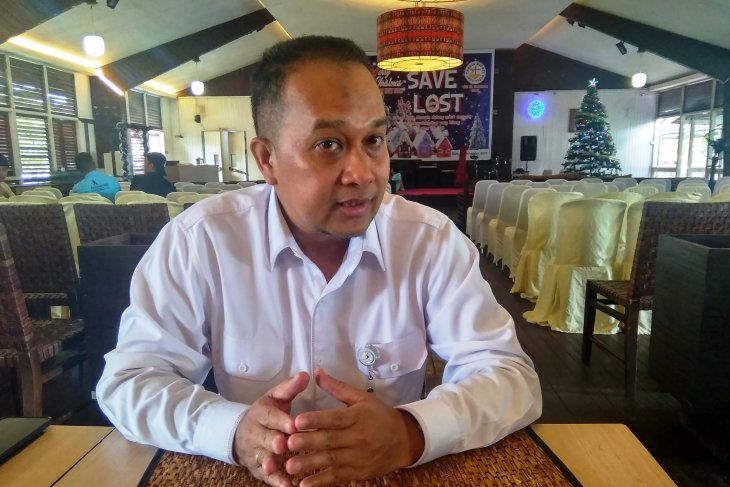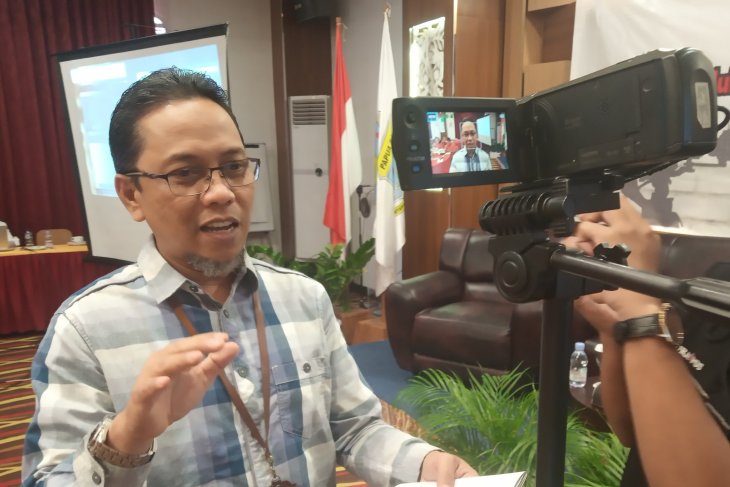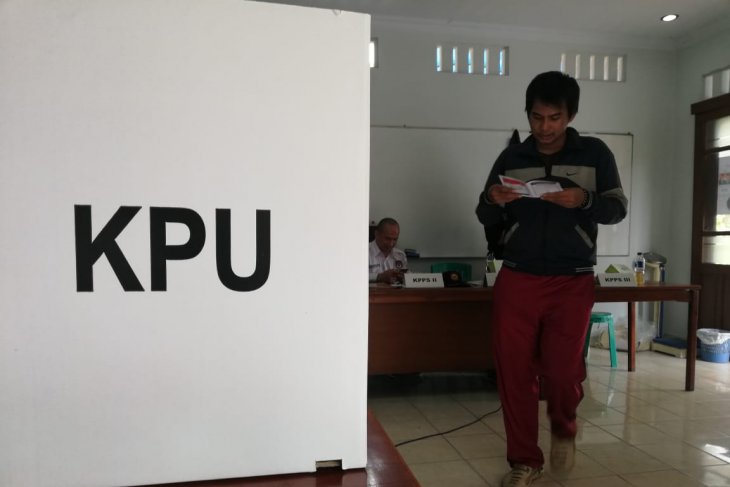Live Streaming
Program Highlight
Company Profile
December
Bappenas Composes Policy Centering on Swifter Development in Papua
Written by Ani Hasanah
Director of Bappenas' Backward, Transmigration and Rural Areas Velix Vernando Wanggai (ANTARA)
The National Development Planning Ministry/the National Development Planning Agency (Bappenas) has drafted a seven-point strategic policy, with focus on boosting development in the provinces of Papua and West Papua. "The seven-point policy to expedite development of Papua and West Papua has been incorporated into the National Medium-Term Development Plan 2020-2024," Director of Bappenas' Backward, Transmigration and Rural Areas Velix Vernando Wanggai stated on the sidelines of a forum for consultations on Saereri customary land in Biak, Papua, on Monday.
In the national medium-term development plan, Bappenas achieved novel breakthroughs to advance development in the two provinces.
He was optimistic that through the seven-point development policy, Papua and West Papua would be able to soon cater to the needs of a variety of local people.
Through the seven-point policy, the government targets, firstly; to develop Papua’s economy in favor of the tourism, fishery, plantation, and production sectors; secondly, to develop tourism, industrial, and rural areas; and thirdly, to develop Papua and West Papua in the context of national human resources.
The development of the two provinces' human resources must be centered on fulfilling the local people's educational requirements, he stated.
"The development of Papuan human resources starts from organizing vocational education, secondary education, or higher education to providing applicative training to Papua’s younger generations," he stated.
The fourth point of the policy is to develop Papua in the context of national culture since the Melanesia race, with specific cultural and physical traits, lends color to the national culture and must be incorporated into the agenda of the nation’s culture, he remarked.
The fifth point prioritizes the development of infrastructure for boosting inter-connectivity between areas through an integrated air, sea, and ferry transport system, while the sixth point aims to develop Papua and West Papua by giving due attention to the environment, climate change, and disaster mitigation.
The seventh point aims to develop Papua and West Papua in the context of politics, defense, and political services. (ANTARA)
December
Population Census Instrumental in Indonesia 2045 Vision: BPS
Written by Ani Hasanah
BPS spokesman Eko Oesman. (ANTARA)
The Central Statistics Agency (BPS) is buoyant of the 2020 population census paving the way to fulfilling President Joko Widodo's vision of Indonesia Onward in 2045. President Widodo targets creating an onward Indonesia in 2045, with per capita income touching Rp320 million annually, or Rp27 million monthly. The national gross domestic product (GDP) is estimated to touch US$7 trillion in 2045. In fulfilling the dream of onward Indonesia, the president also targets alleviating the poverty rate to close to zero percent and to make Indonesia one of the top five economies in the world. To this end, the government has adopted an action plan to develop human resources and infrastructure. BPS spokesman Eko Oesman in Manokwari, the capital of West Papua Province, on Tuesday called for the need for valid data pertaining to Indonesia’s population in order to achieve the onward Indonesia vision. Hence, the population census will serve as a map to attain Indonesian’s population data.
"Indonesia will experience extraordinary demographic bonus. The government is preparing excellent human resources, so the country can benefit from or empower the demographic bonus properly," he explained.
Indonesia yet encounters myriad challenges pertaining to human resources. It is currently ranked 65th in the world in terms of human resources development. The production capacity of Indonesians is yet far from efficient. In the health sector, the country's stunting rate reached 27.70 percent, while the malnutrition rate was found to touch 3.9 percent.
"The other challenges arise in the form of the mathematical, scientific, and reading capacity yet being low. Our literacy skill is also low," he pointed out. The government requires to focus on ensuring that from now on people receive adequate nutrition and education and are able to avail job opportunities, including creating active and self-reliant senior citizens, he added. (ANTARA)
December
ASEAN's Call to Preserve Environment for the Future to Achieve Sustainable Development Goals
Written by nuke
PHOTO : VOI/NUKE
Indonesian environment and forestry ministry held an ASEAN Coastal Clean-up 2019 at one of mangrove forest in the Northern part of Jakarta last Saturday (30/11). Twenty-six ambassadors from ASEAN member states and ASEAN partner countries attended the event. In her opening speech, Indonesian Environment and Forestry Minister, Siti Nurbaya, welcome all ambassadors and asked them to clean up the area along the mangrove forest. She also said that this event was part of Indonesia's commitment for the sustainability of the planet, particularly on the issues of coastal and marine areas as the legacy for future generations, so that they can still enjoy and live in harmony with nature.
"Related to the reduction of marine pollution from land-based activities, Indonesia has made a commitment to reduce solid waste up to 70 percent by 2025. To achieve this commitment, in 2017, President Joko Widodo issued in a Presidential Decree regarding the National Policy and Strategy on Solid Waste Management. The Indonesian Government has also issued a Presidential Decree Number 38 of 2018 addressing strategic action plan on combating marine debris from 2018 – 2025. Indonesia has also launched a National Action Plan to reduce plastic waste through various activities that must be carried out by all stakeholders in Indonesia. In line with this regulation, various stakeholders, including local government, businesses, communities, have taken initiatives and innovations in combattting marine litter" Minister Siti said.
All ASEAN member states have already put the program in place but some are advance and some are not advance, so ASEAN working on it to make sure that waste management is part of the action plan. ASEAN focuses next year to recycle waste for energy as well as other purposes. ASEAN Secretary General, Dato Lim Jock Hoi said that Indonesia has many advance environmental programs. Indonesia and ASEAN are very aware about environment which is in line with SDG's.
"There are a lot of environmental programs being implemented by Indonesian government not only program but also rules and regulations. There are so many rules that are enable Indonesian government to take action to reduce waste management, plastic and they even have a center in Bali for marine plastic. I think Indonesia and ASEAN are very conscious about environment in line with SDG. So we are working very closely among ourself and among ASEAN member states and especially Indonesia. This year alone we have declaration on plastic debris and we have view centers now, one in Bali and the other one in Phuket. So we work closely in order to reduce environmental degradation in ASEAN. We know the impact on environment to our society, to our environment, so we believe this is a good inisiative and we should pursue it in the future" Asean Secretary General said.
The Center will serve as a hub to strengthen capacity building in the field of protection of the marine environment from land-based activities, in particular nutrients, waste water and marine litter/microplastics. The center will seek to develop co-operation with relevant global and regional entities, other relevant international organizations, private sectors entities, and non-governmental organizations. Globally, people faced new challenges in marine environmental issues, such as increased in nutrients pollution, sewage and waste water pollution, and marine litter. Marine litter, especially plastics and microplastics pollution, has been a complex problem affecting ecosystems, social interactions, the economy, the health and the quality of life of the community. It has been estimated that around 80 % of marine pollution, including marine litter, come from land-based activities//NK/AHM/EDT
December
DPR Agrees to Evaluate Simultaneous General Elections in 2019
Written by Ani Hasanah
Illustration - A voter exercises his political right at a pooling both in the 2019 simultaneous election.(ANTARA)
The House of Representatives (DPR) has agreed to a proposal on the revision of law on simultaneous general elections.
Chief of the DPR Commission II Ahmad Tanjung, in Jakarta on Sunday, highlighted the need to evaluate the implementation of the simultaneous general elections in 2019 owing to the several problems encountered.
"There may be a fundamental change in our general elections, particularly simultaneous elections, that must be evaluated," he stated.
He remarked that the DPR Commission II had agreed to revise Law No.7 of 2017 on General Election and Law No.10 of 2016 on Regional Head Election.
For the first time ever, over 190 million eligible Indonesian voters cast their ballots for the president and vice president as well as for members of the Regional Representative Council (DPD), DPR, and Provincial and District/Municipal Legislative Bodies (DPRD) on the same day on April 17, 2019.
In the 2024 general elections, voters will elect not only a president and legislators but also regional heads. "Let us see the developments first since our target is early 2021," he stated.
He noted that voters and election officers will encounter difficulties if the simultaneous elections, comprising the presidential election, legislative election, and regional head election, were to be organized in the same year.
"When the legislative election and presidential election were held simultaneously (this year), they claimed many lives. Moreover, if all the elections are held simultaneously, the number of victims may increase," he stated.
He strongly believes that no lives should be lost in the 2024 general elections.
He highlighted the need to conduct a comprehensive evaluation of the design of the 2024 general elections as well as academic and empiric reasoning. (ANTARA)


